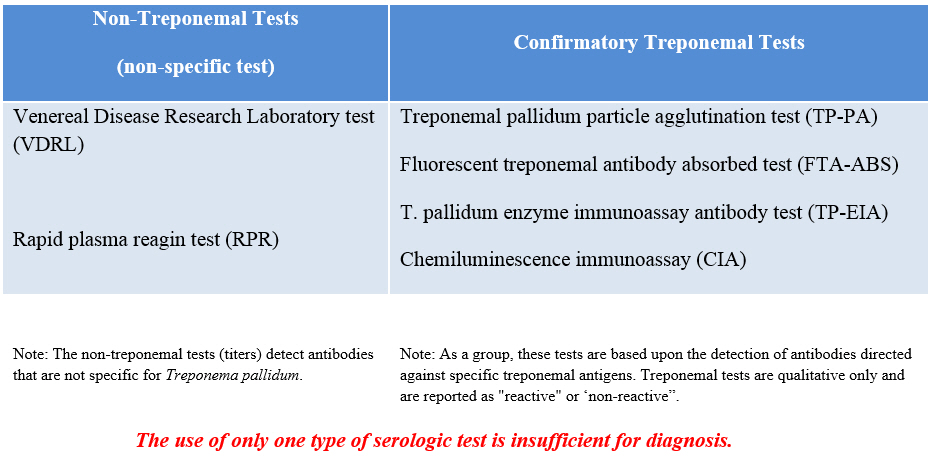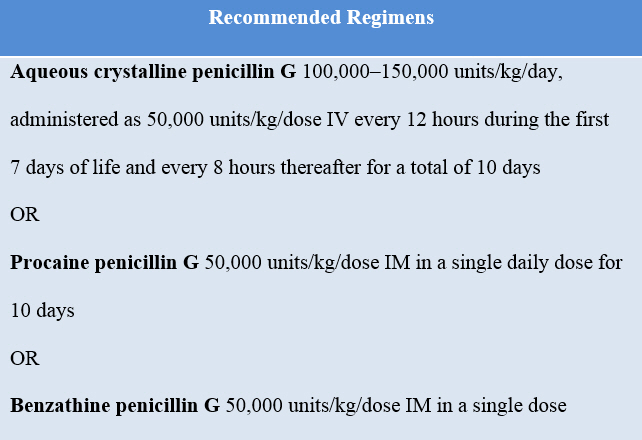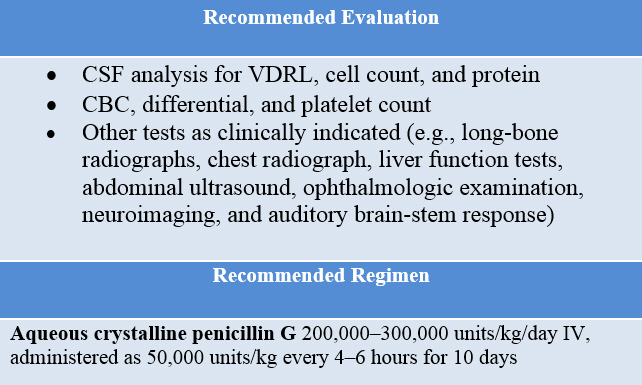Congenital Syphilis (CS) - HAN
Jump To:
Overview
Congenital syphilis (CS) occurs when bacteria Treponema pallidum is transmitted from a pregnant woman to her fetus. Infection can result in stillbirth, prematurity, or a wide spectrum of clinical manifestations.
Clinical Description
Symptoms: Please click here for a downloadable images gallery.
Early Congenital Syphilis — is arbitrarily defined by clinical manifestations with onset before two years of age. Clinical manifestations in untreated infants usually appear by three months of age, most often by five weeks. Click here for signs of congenital syphilis.
Late Congenital Syphilis — is arbitrarily defined by clinical manifestations with onset after two years of age. Hutchinson's triad (Hutchinson's teeth, interstitial keratitis, and eight nerve deafness) is considered pathognomonic of late congenital syphilis. Click here for signs of late congenital syphilis.
Laboratory Criteria for Diagnosis of Syphilis
Direct visualization with dark field microscopy rarely done and only useful for open lesions, body fluids, or neonatal nasal discharge, or;
Polymerase chain reaction (PCR) or other equivalent direct molecular methods of lesions, neonatal nasal discharge, placenta, umbilical cord, or autopsy material, or;
Immunohistochemistry (IHC), or special stains (e.g., silver staining) of specimens from lesions, placenta, umbilical cord, or autopsy material or;
Serological Tests:

Treatment and Special Considerations
Treatment
Recommended Regimens for Pregnant Female: Benzathine penicillin is the only recommended therapy. No alternatives. Click here for details.
For partner testing and treatment: please refer to 2015 CDC STD Syphilis Guidelines, Management of Sex Partners p. 36
Recommended Regimens for Neonates (Infants Aged <30 Days)

Detailed treatment recommendations can be found at CDC 2015 STD Treatment Guidelines.
Follow-Up for Neonates (Infants Aged <30 Days)
All neonates with reactive non-treponemal tests should receive careful follow-up examinations and serologic testing (i.e., a non-treponemal test) every 2–3 months until the test becomes nonreactive. Click here for details.
Evaluation and Treatment of Infants and Children with Congenital Syphilis (Infants and children aged ≥1 month)

Special Considerations
Penicillin Allergy
Infants and children who require treatment for congenital syphilis but who have a history of penicillin allergy or develop an allergic reaction presumed secondary to penicillin should be desensitized and then treated with penicillin. (2015 CDC STD Guidelines, Management of Persons Who Have a History of Penicillin Allergy p. 49).
Penicillin Shortage
During periods when the availability of aqueous crystalline penicillin G is compromised, the following is recommended (2015 CDC STD Guidelines, Penicillin Shortage p. 47).
HIV Infection
Infants and children at risk for congenital syphilis should receive a full evaluation and testing for HIV infection. Please note that evidence is insufficient to determine whether infants and children who have congenital syphilis and HIV require different therapy or clinical management than is recommended for all infants and children. All infants and children with congenital syphilis and HIV infection should be managed like infants and children without HIV infection.
Syphilis During Pregnancy
- All women must be screened serologically for syphilis at first trimester and again at the early third trimester of pregnancy.
- Per state of Illinois, any woman who delivers a stillborn infant after 20 weeks’ gestation must be tested for syphilis. No infant should leave the hospital without the serologic status of the infant's mother having been determined at least once during pregnancy
CDC and Medscape Presentation - Jan 2019
CS Resources
CDC STD Treatment (Tx) Guide Free App for Apple Devices and Android Devices
STD Prevention Resources Handout Syphilis Pocket Guide for Providers
A Guide to Taking a Sexual History
2021 STI Treatment Guidelines
National Network of STD Clinical Prevention Training Centers (NNPTC)
CDC Congenital Syphilis Fact Sheet
CDC STDs During Pregnancy Fact Sheet
California Congenital Syphilis (CS) Evaluation and Treatment Algorithm
Laws and Regulations
State of IL Prenatal Syphilis Act:
Illinois Sexually Transmissible Disease Control Act
Control of Sexually Transmissible Diseases Code
Publications
Congenital Syphilis Brochure (English Version)
Congenital Syphilis Brochure (Spanish Version)
Presentations by:
Bradley Stoner, MD, PhD Syphilis Update 2018: Clinical and Laboratory Considerations
Irina Tabidze, MD, MPH Update on Congenital Syphilis Elimination Efforts
Chaquetta Johnson, DNP, MPH, APRN Programmatic Response to Congenital Syphilis
Virginia Bowen, PhD, MHS STD Increases Across the Board
CS Reporting
To Report a Suspect Case:
For Clinical Questions, Contact:
The CDPH Disease Reporting Hotline at 312-743-9000
*After hours, weekends, and holidays, call 311 and ask for the communicable disease physician on-call (or 312-744-5000 if outside the City of Chicago)
CS Contacts
For Syphilis Related Clinical Questions, Contact:
Irina Tabidze, MD, MPH
312-747-9867
Or
The STD Clinical Consultation Network at https://www.stdccn.org/
